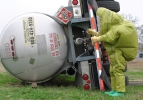The InterAcademy Council, an Amsterdam-based organization, says the International Panel on Climate Change should establish an executive committee with an executive director to strengthen its procedures.
This tool introduces water utilities to the potential impacts of climate change.

Recommendation #6 from the Chemical Emergencies Work Group supports a bill using an approach to inherently safer technologies (IST) that the U.S. chemical industry opposes.
University of California Davis scientists said that most of the antibiotics used to treat dairy cows generally degrade in the top 12 inches of soil.

New positions, recognition and calls to service top this week's summary of movement within the environmental industry.
The agency has set the new deadline for Oct. 13 on the revisions to the total coliform rule.

The catalyst has been licensed to Sun Catalytix, which envisions developing safe, super-efficient versions of the electrolyzer, suitable for homes and small businesses, within two years.
A new report from the Center for American Progress and EnergyRM indicates that a robust program of smart policy incentives and investments could make a big difference for businesses looking to invest in the growth of clean energy jobs.
The Institute for Southern Studies report says the federal government still hasn't properly responded to the problems on the Gulf Coast caused by Hurricane Katrina.
Long-standing pesticide faces government review, an activist campaign, and two lawsuits.
The Innovative Sanitation as a Business Program grant will support solutions in Africa, Asia, and Latin America.
In a cooperative research and development agreement, the team will try to increase the effectiveness of the municipal drinking water distribution network for delivery of better quality water while using less energy.
Students from Saint Martin's University found that less heat is lost using flat ceramic infrared electric emitters in research supported by Puget Sound Energy.
The city will implement a comprehensive, system-wide plan to ensure that all sanitary sewer overflows associated with insufficient capacity of its separate wastewater collection system are prevented within 12 years.
In one example, the Texas Commission on Environmental Quality did not allow adequate review of impacts on total air pollution levels should changes in the Pollution Control Project Standard Permit be approved, the federal agency reported.
The House Transportation and Infrastructure Committee said it has evidence that residents affected by the recent spill in Michigan are being asked to waive legal rights or sign over medical records.
By 2016, the state will require refiners to produce oil with a maximum sulfur content standard of 15 parts per million; the current standard is 2,000 to 3,000 parts per million.